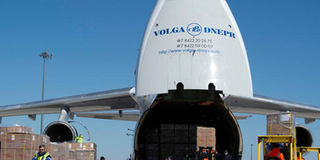Masquerade or needed aid? China virus help proves contentious

Boxes of masks flown in from China on a special flight being unloaded in France earlier this week to help alleviate a shortage of protective gear for health care workers. AFP Photo
China has stepped in to help the West tackle the coronavirus crisis after managing to quell its own outbreak. But critics view the aid, though indispensible, as part of a cynical ploy to project Chinese influence.
As European and American healthcare systems creak under the strain, China has offered millions of face masks and teams of medical experts.
As well as seeking to deflect criticism over initial Chinese missteps in handling the epidemic, analysts say, the campaign is a public relations opportunity in China's great power rivalry with the West and especially the United States.
COVID-19 first emerged in a wild animal market late last year in the Chinese city of Wuhan, but Beijing says the situation in China is now under control with domestic cases dwindling to zero.
By contrast, Europe and the United States have become hotspots of the pandemic with much of the West now in lockdown to curtail the spread of the virus and limit the burden on health systems.
As governments scramble to cope, China is showering nations across the globe including in the EU with masks, experts and equipment.
Austria, Belgium, France, Hungary, Italy, the Netherlands and Spain have all received assistance.
China asked for discretion when the EU sent help in January but is conversely trumpeting its own support in a "PR campaign without precedent," according to political science expert Antoine Bondaz from the Foundation for Strategic Research (FRS) in Paris.
The ideological battle around COVID-19 represents the latest flare-up of tensions between China and the West, after spats over Beijing’s military build-up in the South China Sea and over the expansion of tech giant Huawei.
"(Beijing) seizes every national or international opportunity to show the supposed 'superiority' of its system," Alice Ekman from the European Union Institute for Security Studies (EUISS) told AFP.
- 'Battle of narratives' -
EU Commission President Ursula von der Leyen initially expressed gratitude on March 18 for Beijing's support.
But the warm tone has turned sour.
The bloc's foreign policy chief Josep Borrell last week called on Europe to stand ready for a
"struggle for influence" in a "global battle of narratives".
"We must be aware there is a geopolitical component including a struggle for influence through spinning and the 'politics of generosity’," the newly-appointed Spanish diplomat said.
Borrell accused Beijing of initially covering up the outbreak, saying this paved the way for its rapid, global spread.
"Armed with facts, we need to defend Europe against its detractors," Borrell said.
French Secretary of State for European Affairs Amelie de Montchalin told French radio Sunday:
"It's sometimes easier to spread propaganda, pretty images and sometimes to exploit what is happening."
And French President Emmanuel Macron on Tuesday pointed to a massive order of much-needed face masks from China as a wake-up call for boosting domestic "independence".
"This crisis has taught us that the strategic nature of certain goods, certain products, certain materials require European sovereignty," the president said.
- 'Original sin' -
Beijing has repeatedly expressed fury at US Secretary of State Mike Pompeo's insistence on referring to COVID-19 as the "Wuhan virus" also to the consternation of some G7 counterparts who fear such a term risks encouraging racism.
Chinese officials have also sought to sow doubt over the origin of the virus.
On March 12, Chinese foreign ministry spokesman Lijian Zhao tweeted: "It might be the US army who brought the epidemic to Wuhan. ... US owe us an explanation!"
Beijing is seeking to wipe out its "original sin" both domestically and internationally, researcher Francois Heisbourg told AFP.
In some countries, China's propaganda may find fertile ground, said Ekman.
"Russia, Iran, Pakistan and Algeria amongst others wouldn't be displeased to announce together (with China) a post-Western 'new world order' when this crisis ends," the expert said.
On the European Union's very doorstep, aspiring bloc member Serbia has already been drawn into the battle for influence.
"European solidarity does not exist. That was a fairy tale," President Aleksandar Vucic said after the EU banned exports of medical supplies.
Vucic then praised the Chinese: "the only ones who can help us", and addressed Chinese president Xi Jinping as his "brother" after Beijing pledged to send help.
"Some people, in their heart of hearts, are very impressed with the successes of Chinese governance," China's embassy in France tweeted last Friday.
"They envy the efficiency of our political system and hate their own countries' inability to do as well!"




